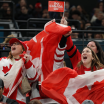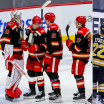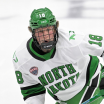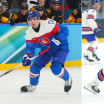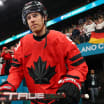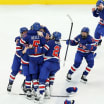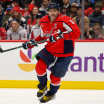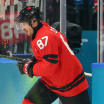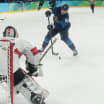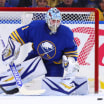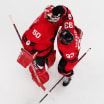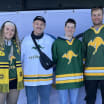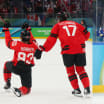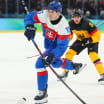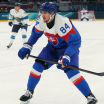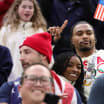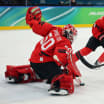In NHL.com's Q&A feature called "Sitting Down with …" we talk to key figures in the game, gaining insight into their lives on and off the ice. In this edition we feature Hilary Knight, who helped the United States win the gold medal in women's hockey at the 2018 Pyeongchang Olympics and eight gold medals at the IIHF Women's World Championship.
Knight talks Dream Gap Tour, 2026 Olympics in Q&A with NHL.com
Women's hockey star working as NHL analyst for ESPN while playing PWHPA events
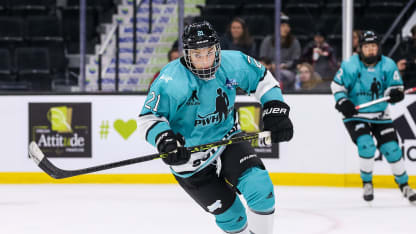
© Chris Tanouye/Freestyle Photo/Getty Images
By
Sean Farrell
NHL.com Independent Correspondent
Hilary Knight discovered Cammi Granato and women's hockey when the United States won the gold medal at the 1998 Nagano Olympics, the first to feature women's hockey as a medal sport. Twenty years later, Knight made a similar impact on a new generation of American girls when she followed in Granato's footsteps as a member of the second U.S. team to win Olympic gold.
The 33-year-old forward helped the U.S. win the silver medal at the 2022 Beijing Olympics in February, so now it's the desire of returning to the top of the podium for the 2026 Milano Cortina Olympics that fuels Knight's will to continue competing at the elite level.
And she's not taking another opportunity for granted.
"We'll see where the cards shake out," Knight said. "It's a game of still loving it, because it's hard to do what we do, and then staying healthy. You can control what you can control."
She plays for Team Sonnet on the Professional Women's Hockey Players Association (PWHPA) 2022-23 Secret Dream Gap Tour, and she is working as an NHL analyst for ESPN.
NHL.com recently caught up with Knight and talked about her favorite player growing up, the challenges and fun of being a TV analyst, her hopes that women will be able to make a living playing the sport they love, and taking on mortgage payments.
What are you up to these days?
"Right now it's home ownership, I'm just dialing that away. I thought I was done playing and ready to move out to the west, and you get the itch and you want to get back and you can still play, you can still contribute and you want to still do that. So I kind of did a 180, went back to Minnesota. All of our girls are there training, so it's a lot more fun when you're training with other people. So I'm doing that and then just trying to keep the dream alive, I guess, in many ways. So I'm working with ESPN as an analyst again this year, part-time role. So jumping in different games here and there, both in-studio and in-venue, which is exciting. I'm learning a lot from that standpoint of things. And then all the other things that we kind of wear our hats in different areas to grow and promote the sport and increase visibility in women's sports in general. So traveling around for different panels. And everyone wants to do in-person now, no more Zoom. So a lot of traveling for that. But I wake up, and I know it's a huge responsibility, but I also feel it in my heart that it's one of the best jobs in the world, to be able to get up, to train, to be healthy, active and train alongside those women and build something outstanding here with the PWHPA."
You mentioned keeping the dream alive. The term dream gap figures prominently in the name of the tour. How do you define the dream gap for people who are not familiar with what that represents?
"For people who aren't necessarily familiar with the space, essentially we're striving to have the equivalent to the men's programming at that level, at the elite level, and we've never had it on the women's side before. And so once you graduate college, there's this awkward gap in time and programming, resources, and everything you need to be an elite-caliber player. And unless you're on one of the national teams, kind of that's it. So what we've put together with Secret is called the Dream Gap Tour, and rightly so, it's filling that gap right now for the next best thing that's going to come along and be that outstanding league where we can earn a livable wage and have the resources, have the programming and everything that we need to just be players. And the next generation, as they're growing up they know that when they sign up for this game, if they love it and they want to take it all the way through, they're going to be able to do that as a full-time profession."
Who was your favorite hockey player growing up?
"To be honest, until I saw the '98 team, I didn't know women's hockey was a thing. So Cammi Granato is the first women's player that I saw. But before that, Chris Chelios. That's just how it worked out. I liked Chris Chelios, (Dominik) Hasek, Chris Osgood, and I always thought I wanted to be a goalie. The Blackhawks weren't on TV a lot so we watched a lot of Detroit Red Wings games back in the day, 'Stevie Y' and all of them. So it's funny how things work out. I think just growing up you understand how important visibility is, and you see the '98 team win and you're like, 'I want to do that.' And I can do that now and that's how I know it's that important."
By winning the Olympic gold medal in 2018 in Pyeongchang, do you think your team made an impact on this generation of American girls similar to the one made by the 1998 U.S. women's team?
"Yeah. I mean, it's no mistake that we get a huge spike in numbers after we win, right? So it's just everyone wants a piece of you because you win, and that's just how sports are. And I think that's sort of in the back of the mind. You want to win because you're a competitor, but you also want to win because we know it takes the game to great heights in the United States. Everyone loves winners down there and so that's what you want to do."
Sarah Nurse is featured on the cover of EA Sports NHL 23 with Trevor Zegras of the Anaheim Ducks. How big a deal is that for the women's game?
"Huge deal. I can't wait to see Sarah on the cover without anyone else. I think that's the next step. So awesome player, awesome person to be on the cover for something like that. It's about time we got into the EA game. I think it's great. I love what we're doing there and it's a wonderful starting point."
Is there any kind of buzz now among your peers about which women's player could be the next to get a cover?
"I don't know. I'm sure it's there, right? Like, you see someone doing it and you're like, 'Oh I want to do that.' And I think that's great, shattering those ceilings that we haven't necessarily been able to do for so long and to have an opportunity to be on the cover. It's pretty cool."
You won an Olympic gold medal in 2018 but then it was a silver medal in Beijing in 2022. Is 2026 circled on your to-do list?
"It's definitely there, right? You can't not think about it. I think we really squandered the talent that we had in the room in 2022, and as a player it's frustrating. You go through all that and you just come up short, so you definitely get that bite that you want to come back and that hunger in your belly to feel full. And I think that's just the competitors in us being able to say, 'OK, let's go back, let's put it all on the line again.' But some great hockey is played at that level and you always want to play at the highest level. It's always so much more fun when the game slows down and ... it's just, it's beautiful. I don't know how else to describe it."
What have you learned from being involved in the TV broadcasts?
"It's a lot harder than people think it is, I'll say that. You have to be able to take what's in your brain and talk to a whole array of different types of people at different levels of knowledge, and to be able to take what's going through my brain and just spit it out is quite challenging. So it's been a good learning experience for me. But it's a lot of fun to be able to add sort of my perspective to the game. And also to sit on a bench with 'Cheli' and Mark Messier is pretty cool. Not too bad, huh? It's been a lot of fun and the ESPN crew has been really great to get to know different people."
What's your downtime like?
"Sitting still, just hanging out with my two English Bulldogs, Bane and Baloo, and hanging out with people. I love the girls in our room so when we have a dead second we're just doing stuff. I'm excited to go carve pumpkins and go to an apple orchard, do sort of a normal thing. I get to go home, live in the mountains and just kind of take a breath, unhook my phone from anything and just be a normal human. But I love what I do. I wouldn't change it for the world."
